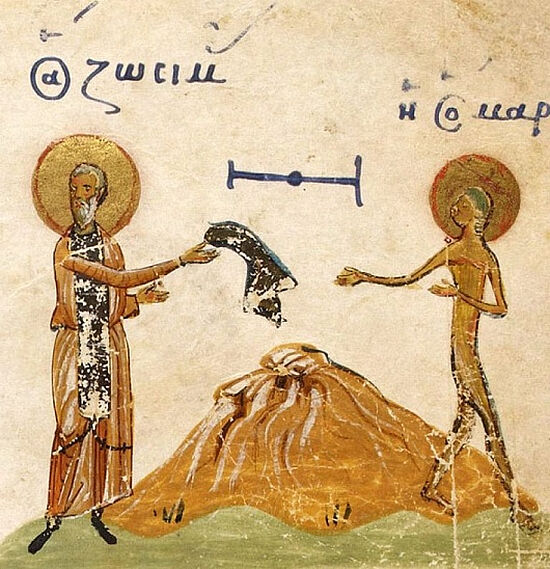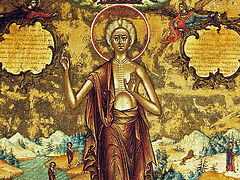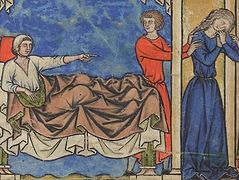Today we glorify St. Mary of Egypt, who from the rank of great sinners became a great righteous one. Thus, rejoice, sinners! To you is opened not only the doors of repentance, but also the bridal chamber of glory. Look at what St. Mary was and what she became and be inspired to follow her courageous path. The Lord called her and she rose up and went, and having gone, she never turned back. The Lord is calling all of us now: And who hasn’t responded to this, His merciful calling? Almost everyone has already fasted, confessed, and communed of the Holy Mysteries; that is, you’ve heeded the calling and risen up. Let us now walk steadily along the same path that St. Mary walked, having risen up from the fall, in order to achieve what she finally achieved.
St. Mary repented and left everything, and having crossed the Jordan, there, in the desert, she left a strict life and was cleansed from the passions and was saved. This is our example! Prepare yourselves to emulate her.
Perhaps none of us literally took a vow, but everyone should act exactly like this, if we consider not the outward appearance of actions, but at their spirit and strength.
Having departed into the desert, St. Mary distanced herself from the allurements of the world and thereby cut off all temptations from their side. After this, sin could only draw her through the flesh. But her flesh also was given no rest in the desert. Fasting, lying prostrate, and the heat and cold exhausted her. And here are two powerful ways that she withstood and overcame sin: departing from the world and the exhaustion of the flesh.
The exhaustion of the flesh is a means we all understand and can use. Reduce your measure of food, assign yourself more work and less rest and sleep, choose hardness instead of softness, cold instead of warmth, tension instead of laxity, self-reproach instead of various carnal pleasures, and you will exhaust and deplete your flesh and thereby suppress the passions seated within it. But how can we who live in the world depart from it?
There is a removal from the world in the body—this is the departure into the desert. But there is a departure from the world without leaving the world—distancing ourselves from it by manner of life. The first is not appropriate for everyone and not everyone can do it, but the second is necessary for everyone and must be fulfilled by everyone. This is what St. Andrew invites us to in his Canon when he advises us to retire into the desert in fulfillment of this law. Thus, abandon the customs of the world and let your every action and step be done as the good law of the Gospel commands, and you will live in the midst of the world as though in the desert. This fulfillment of the law will stand between you and the world as a wall, through which the world cannot be seen. It will be before your eyes, but not for you. The world will have its own cycle of changes, but you will have your own rank and your own order. It will go to the theater, and you will go to church; it will dance, and you will make prostrations; it will go out for a walk, and you will be home in solitude; it will be talking idly and ridiculing, while you are in silence and praising God; it enjoys comforts, and you are at work; it reads empty novels, and you reading the word of God and Patristic works; it is out at balls, and you are in conversation with like-minded people or your spiritual father; it makes selfish calculations, and you are practicing self-sacrifice; it is in passionate dreams, and you are in divine contemplation. Thus, set rules for yourself in everything and establish an order in your life that is contrary to the customs of the world, and you will be in the world but not of it, as in the desert. Neither will you be visible in the world, nor the world in you. You will be a desert-dweller in the world. And you will become an imitator of St. Mary without having to retreat to the desert.
If, as I have mentioned, you add to this bodily fasting, labors, vigils, and the general deprivation of all rest, then you will possess both means by which St. Mary overcame her passions and was saved.
Let me put it succinctly: Flee from rest for the flesh and establish an order in your life that is contrary to the customs of the world, or protect yourself with fulfillment of the law. Do this and you will overcome the passions, and you will be saved.
For this is what will happen to you, as St. Isaac teaches, if you master these two methods: subjugation of the senses, sobriety of mind, meekness of thoughts, clear movement of thought, diligence in actions, lofty and subtle mental conceptions, tears without measure, remembrance of death, pure chastity far from any tempting fantasy, mysterious concepts that the mind grasps with the aid of Divine words, fear that cuts off laziness and negligence and extinguishes all desire, and at the end of it all—the freedom of the true man, spiritual joy, and resurrection with Christ in the Kingdom. This is salvation.
If anyone neglects these two methods, he should know that he will not only harm himself in everything, but will shake the very foundation of the virtues. And just as they’re the beginning and head of Divine work in the soul, and the door and path to Christ for the man who maintains them within himself and abides in them, so if a man retreats and withdraws from them, he will come to their opposite vices: fleshly indulgence and bodily wandering, that is, following the customs of the world, which open the entrance of the soul to all sins and passions.
Indulge completely in the customs of the world, which are all nothing but bodily vagrancy; indulge in this wandering alone and see what happens! Inappropriate and unexpected gatherings (I’m here continuing the word of St. Isaac) that lead to falls; the rebellion of strong sensations aroused by sight; a quick inflammation that takes over the body; uncontrollable thoughts that race towards a fall; the cooling of love for the works of God and the complete abandonment of the rules of your new life; resuming forgotten evil deeds and teaching them to others who didn’t know them before. And the passions that were already mortified in the soul by the grace of God and eradicated by forgetting memories begin to move again and compel the soul to engage in them. This is what will be revealed in you as a result of your first indulgence, that is, the wandering of the body according to the customs of the world and impatience in enduring a sorrowful existence in the new order of life. And the things that will happen from indulging the flesh, especially gluttony, can’t be enumerated. From this follows a heaviness in the head, a great burden on the body, and relaxation in the muscles, the abandonment of prayer rules, laziness in making prostrations, the darkening and coldness of the heart, coarseness of mind and thoughts, an obscuration, a thick and impenetrable fog stretching across the entire soul, strong despondency and boredom in every work of God, as well as an inability to taste the sweetness of God’s words when reading, thoughts wandering all over the earth, foul phantoms filling the soul and igniting lust, incessant and unbearable burning throughout the body, and from this, new seductive thoughts emerge, which, merging with the soul, lead it to fall into the passion of dishonor, first internally—through agreement, and then externally—through actual deeds.
These are the bitter fruits of wandering according to the customs of the world and any indulgence of the flesh! The enemy knows that whoever succumbs to them will surely become his prey. This is why he tries in every way to either disrupt the established new order of a good life or to incline one towards some kind of indulgence of the flesh. Compromise in one thing and you’ll fall into another, and with both you won’t avoid falling into sin and the return of your former passions. Indulge the flesh, and it will lead you to indulgence in the customs of the world. Or indulge in the customs of the world, and they’ll lead you to indulgence of the flesh. One enemy will pass you to another while not falling behind himself, and together they will then always drag you into a fall. Knowing this misfortune, stand firm in what you have begun. Love of this earthly life will stand for the flesh, and people-pleasing for the world. Counter them with the feeling of true life in mortifying the flesh and fellowship with true people in rejecting the customs of the world. The flesh will whine and the soul will yearn, so arm yourself with patience. Inspire yourself with the thought that death awaits either way. From indulgence of the flesh and the world, death through falling into sin is true and eternal death. The flesh and the world also threaten death to those who go against their demands, but this death is illusory, not real, and fabricated by the enemy to frighten us. Let us rather condemn ourselves to this death for salvation, to avoid ruinous death.
This is difficult, of course, which is why this is called the “narrow” and sorrowful path, though it also comes with the consoling promise by the true God that it leadeth unto life (Mt. 7:14). But only a fool, as St. Isaac says, prefers a small, immediate rest over the distant Kingdom, not knowing that it’s better to suffer torment in a spiritual labor than to rest on the bed of an earthly kingdom and be condemned for laziness. The wise long for death, only so as not to fall under the accusation of having performed any of their deeds without sobriety. Do not be disheartened when it is a matter that will bring you life, and don’t be too lazy to die for it.
With such thoughts and such fatherly instructions, strengthen your determination to stand in the new good order of life, in contrast to the customs of the world, and not to fulfill the lust of the flesh (cf. Rom. 13:14). By this you will escape the painful work of subservience to sin—and you will enter into the liberty of the children of God (Rom. 8:21), when, strengthened by the power of God, you will begin to walk in the commandments and ordinances of God unhindered, effortlessly, without special sacrifices, as sons walk in the house of their father.
Amen.





